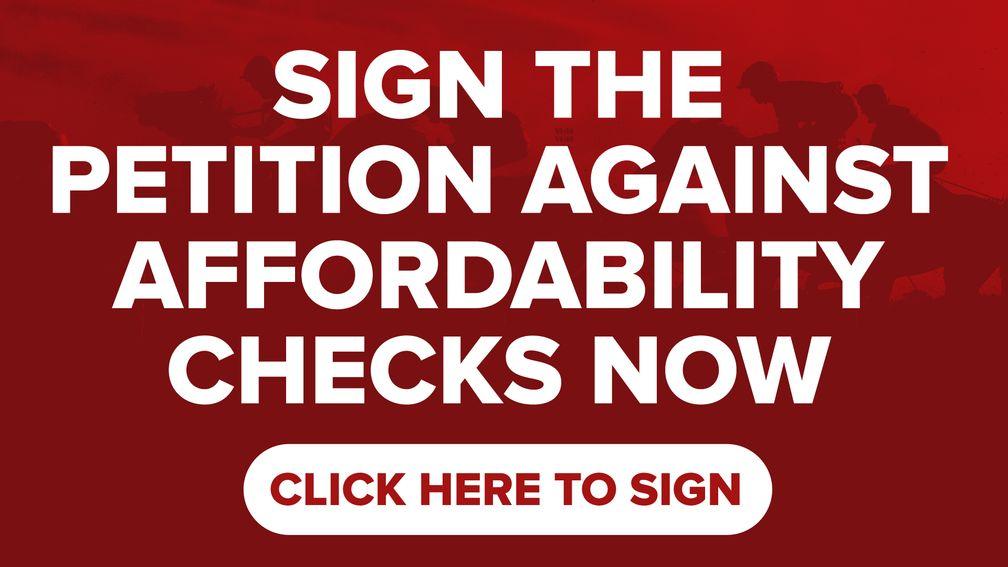Five reasons you should sign the affordability checks petition

Thursday's comments from Lucy Frazer, the secretary of state for culture, media and sport, are welcome and will provide some reassurance that the government is truly listening to the concerns of racing and bettors about the impact of affordability checks.
It is particularly encouraging to see the minister acknowledging the "onerous" affordability checks already in place, which have caught tens of thousands of punters in their net and are already having an appalling impact on racing's revenues.
But if the government wished to address the scourge of affordability checks, it could do so by insisting the Gambling Commission makes it clear that bookmakers are not expected to collect the private financial information of customers.
Instead, the government has committed to rolling out affordability checks as official policy. And while prime minister Rishi Sunak and his cabinet seem genuinely determined to ensure checks are as 'frictionless' as possible, that the damage to racing is minimised and that ordinary punters are not inconvenienced by invasive checks, that doesn't address the fundamental issue that financial checks on bettors are disproportionate, unnecessary and poorly conceived.
Nor does it provide reassurance that the unintended consequences of a well intentioned policy won't be every bit as damaging to racing as feared, or that the Gambling Commission can be trusted to implement government policy as judiciously as ministers intend.
That's why the Racing Post is supporting the petition launched by the Jockey Club on Wednesday night calling on the government to scrap the implementation of affordability checks. Here are five important reasons we believe that every punter, fan of racing and industry professional should add their name to the petition:
1. Affordability checks are an attack on our civil liberties
Affordability checks have become such a common feature of gambling for many that it is easy to forget just what an unprecedented attack on our basic freedoms they are. Never before has a British government attempted to interfere in how individuals spend their own money. It is hard to think of a more objectionable real-world example of the 'nanny state' than the government insisting on financial checks for those deemed to be spending too much of their own money.
2. Affordability checks are driving punters away from racing
Ample evidence exists to demonstrate that the checks are actively driving people away from racing. Multiple surveys have shown that most punters will simply stop betting rather than comply with checks, owners have left the sport or downsized because they can no longer back their horses, and racecourse groups have reported falling revenues from betting. As checks proliferate and punters run out of unrestricted accounts, some will give up on the sport.
3. Affordability checks are causing 'catastrophic' damage to racing
The direct consequence of point two is damage to racing's finances. Industry leaders recently calculated that the government's affordability checks proposals would cost the sport £250m over five years, and that's on top of what's already been lost to the sport – over £1 billion in lost online betting turnover since 2021, according to Arena Racing Company chief executive Martin Cruddace. That's diminishing the sport's ability to invest in prize-money, racecourses and promotion. Ultimately, it could cost thousands of jobs in the sport and make British racing even less competitive than it is.
4. There's no evidence affordability checks help prevent problem gambling
All the above might be a price worth paying if affordability checks truly stopped problem gambling, which affects only a small minority of bettors but is undeniably devastating for those impacted. Yet there's no evidence that it does. After more than two years of them being widely deployed in Britain, there's not a single academic paper or statistical indicator that suggests they actually work. Indeed, logic suggests that the sort of person who will be deterred from betting by a check is the person for whom betting is a hobby, while those with an addiction will find a way to keep going – including via the black market. Problem gambling must be tackled, but affordability checks are not the solution.
5. Every signature matters
The petition might be the last chance to change minds and alter policy, and it's essential that the sport and bettors show politicians the strength of feeling against the proposals. There are 88,000 people employed in racing and millions who bet on the sport. A huge response to the petition from these groups will be an unequivocal statement to politicians that a change of direction is necessary.
Read these next:
BHA chair welcomes culture secretary's support and promise of 'frictionless' affordability checks
Lucy Frazer: the government is listening to concerns about the future of British racing
'Take a minute to sign the petition' - racing unites in opposition to affordability checks
Affordability checks: sign the petition now

Sign up to receive On The Nose, our essential daily newsletter, from the Racing Post. Your unmissable morning feed, direct to your email inbox every morning.
Published on inTom Kerr
Last updated
- Our sport is facing a daunting task - but here are three crucial steps to arrest the spiralling decline in betting activity
- Alastair's love of racing sang from every line - and his ability to tell the story of a race was unmatched
- A high-regulation, high-tax environment would spell disaster for British racing
- Bold promises fizzle out as British racing's leaders struggle to deliver on radical change
- Was Julie Harrington a good leader of British racing? It's complicated
- Our sport is facing a daunting task - but here are three crucial steps to arrest the spiralling decline in betting activity
- Alastair's love of racing sang from every line - and his ability to tell the story of a race was unmatched
- A high-regulation, high-tax environment would spell disaster for British racing
- Bold promises fizzle out as British racing's leaders struggle to deliver on radical change
- Was Julie Harrington a good leader of British racing? It's complicated


